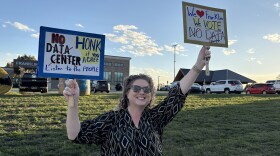A University of Kentucky computer science professor is leading a team that’s attempting to decipher a 2000-year-old manuscript about life after the reign of Alexander the Great using machine learning technology.
The international effort is being led by University of Kentucky alumni professor of computer science Brent Seales. Seales, along with a cadre of doctoral students, staff members and undergraduates, is using computed tomography (CT) scans – similar to medical technology – to identify ink on papyrus paper that was partially burned during the eruption of Mount Vesuvius in 79 AD and rediscovered centuries later.
“What we can do medically with the kinds of imaging that we have now is truly spectacular and we're applying some of those same methods to the analysis of these ancient materials,” Seales said. “The technology allows us to image everything that's inside these carbonized scrolls, without opening them because the X-rays that we use for the imaging go right through and they let us map out the structure of what's inside.”
After they’ve mapped the scrolls, Seales and his colleagues can use algorithms and “machine learning” to recreate the contents.
This process isn’t a new one for Seales. He’s been using technology to decipher ancient artifacts since the 1990s. His first project involved capturing the Beowulf manuscript. The professor said he’s excited about the revelations the project could bring, maybe even too excited.
“These objects are fantastic,” Seales said. “I always have a feeling of, you know, reverence and respect when I am able to work on any of these things.”
The UK professor and his team are working alongside Richard Janko, a papyrologist and classical studies professor at the University of Michigan.
Janko will be studying the ancient writings on the scroll, which he told colleagues during a conference in January was likely “a lost work” recording the history of the dynasties that reigned after Alexander the Great.
The manuscript was originally discovered in a library in the ancient city of Herculaneum – now known as the Italian city of Naples – which was one of the cities destroyed during the eruption of Mount Vesuvius. Seales said it was found in the 1750s by Italian welldiggers and it was given to Napoleon Bonaparte as a gift in 1804. Bonaparte would later donate the artifact to the Institut de France in Paris.
Seales said they have not read any of the deciphered material from the manuscript yet.
“We've been working on the best way to organize the data and how to make the ink appear so that it's readable,” Seales said in a recent interview. “The collection (at the University of Kentucky) has many, many examples of scrolls that were opened or partially opened and we're also imaging all of that material.”
This won’t be the last project of its kind for Seales and his department.
The University of Kentucky is building a laboratory that will allow the university to be an international institution to accept and analyze ancient artifacts. Seales expects the facility, which is being funded by a $14 million infrastructure grant from the National Science Foundation, to open in 2026.
“We think that there is material right here in the United States of America and probably in Kentucky that could benefit from the kind of analysis that we're able to do,” he said. “So together, with the expertise, that equipment is going to help us do work right here in Kentucky.”





